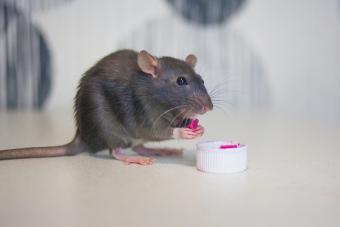
Rats are intelligent, social creatures that make excellent pets. Rats are also easily tamed, making them ideal for people who enjoy handling their pets. They are also suitable for people of all ages, making them a highly desirable companion.
Rats Make Fantastic Pets
Rats have a terrible reputation as a filthy species that lives in sewers and dark places. While wild rats are certain to get themselves into some uncomfortable circumstances, rats who are bred as pets are completely different than those you would find roaming New York City. Rats have a lot of enticing characteristics that make them good companions for kids, adults, and seniors.

Rats Enjoy Your Company
Rats are engaging pets who love interacting with humans. They develop strong bonds with their owners. Also, they enjoy cuddling and climbing all over their owners, and as long as they are properly socialized, they enjoy being handled and petted. Rats are known to comfortably sit on their owners' shoulders or on their heads, or slumber in their laps when given the opportunity. Rats have also been found to feel emotions just as people do, such as loneliness and empathy, which help drive their social behavior around people, as well as other rats.
Although pet rats are reasonably easy to care for, they are not low-maintenance pets. They need a lot of attention and time outside of their cages to exercise -- at least an hour per day is optimal. This shouldn't be a problem if you can delegate a portion of your day. Many rat owners like their pets' curiosity and compare their connection to that of a dog.
Because rats are sociable creatures, they should never be left alone. Pairs or groups of rats of the same sex are acceptable. Male rats generally get along well with other males, especially if they are introduced at a young age or are litter mates.
Rats Can Be Trained
Rats can be taught to do a variety of tricks and behaviors. A rat is a fantastic beginner pet if you want to learn about animal behavior and training but don't have the space for a dog. They pick up on clicker training rapidly and can be house-trained, taught their names, and trained to do just about anything physically conceivable, including rat agility courses.
Rats Are Relatively Easy to Care For
Rats are relatively low-maintenance compared to some other small pets. They keep themselves very clean, much like a cat, although they will rely on you to keep their cage from getting dirty. You won't need to bathe or brush them, other than for special medical circumstances. You won't have to deal with shedding and some rats are even hairless.
Although, it's important to realize caring for a hairless rat is much different than caring for one with fur. You will need to take additional care of the skin of a hairless rat in order to keep them healthy. This entails giving them a bath on a monthly or biweekly basis with sensitive-skin shampoo. Hairless rats also require daily rubbing with baby oil and aren't as hardy as others.
Rats Don't Tend to Bite
While pet rats can bite, they have a reputation for being far less likely than other similar pets to do so, especially when they are handled from a young age. A rat is a better choice for a child-friendly little pet than other pocket pets, which have a tendency to bite and are less adaptable to handling.

Pet Rats Are Suitable for Apartment Life
Rats don't need large areas to run around in, so you can easily keep rats happy living in a small space, such as an apartment or condo. They do need to have time outside of their cages, but they won't need a yard to roam in so they're a much easier pet to keep than a dog, for example.
The Downside of Owning Rats
There are a few drawbacks to having a rat as a pet. These are things to think about before getting a rat. Rats have a lifespan of 1 to 3 years. If you're worried about becoming connected to a pet and grieving over them, you might want to reconsider acquiring a rat. On the other hand, some pet owners prefer this to the far longer time commitment that comes with owning a dog or cat.
Because rats have such a short lifespan, it's fairly uncommon for them to have medical problems as early as their first year. Rats are susceptible to many of the same medical issues as other pets, including cancer, respiratory infections, and parasites. Finding a rat-savvy veterinarian can be difficult, so it's a good idea to start looking for one before bringing a rat home.
Rats can transfer some zoonotic diseases to their owners, although all pets carry this risk to some degree. Common diseases that can be caught from rats are salmonellosis, campylobacteriosis, and leptospirosis. If you have an immune disorder, you may want to consult with your medical professional before considering bringing home a rat as a pet.

General Rat Care
If you're set on getting a rat, there's some basic information you should know in order to care for them properly.
Diet
Rats can eat a pellet diet purchased at a pet supply store, such as Oxbow Adult Rat Food. To add nutrients to their diet, you should supplement their diet with fresh foods. You commonly see cartoon rats eating cheese, and while there's no doubt rats love cheese, that shouldn't be the only snack available to them. Rats can also eat small amounts of plain, cooked chicken, fruits, and veggies. Rats also enjoy edible insects, such as mealworms. Always check with your veterinarian before giving your rats supplements to make sure the food is safe.
Should You Purchase a Male or Female?
When it comes to adopting a rat as a pet, there are clear distinctions between the sexes. Female rats are more active than male rats. Females, like dogs and cats, are smaller than males. Which is "better" is a matter of personal taste. A female rat might be a better choice if you're searching for an outgoing rat who enjoys crawling all over you and learning tricks. If you're looking for a snuggler who just wants to hang out with you, males are the way to go.
Where to Get a Pet Rat
As far as species go, the Norway Rat is frequently the one associated with pet stores and shelters. A pet store is only a suitable place to purchase a pet rat if the employees are informed about rats. Determine whether they keep them in adequate and hygienic housing, feed them a healthy diet, and handle them on a frequent basis. To avoid a surprise litter, search for stores that separate males and females.
Breeders (also known as ratteries) are the ideal place to go if you want a well-socialized young rat. From a young age, a good breeder ensures babies are socialized and handled. A breeder is also likely to be your sole option if you're seeking a specific coat type or color of rat.
If you want to save a rat in need of a home, you should always look into animal shelters. PetFinder offers a directory of rescues and shelters where you may find a new pet rat to rescue. Choose a rat with a kind disposition, but keep in mind that rescued rats may be wary or hesitant at first. You can generally overcome shyness with perseverance.
Choosing a Rat as a New Pet
Rats make excellent pets for a variety of reasons. They're intelligent, caring, and like social situations. In comparison to other pocket pets, they're also simple to care for. Don't let wild rats' bad reputation discourage you from giving these friendly rodents a chance to win your heart.







